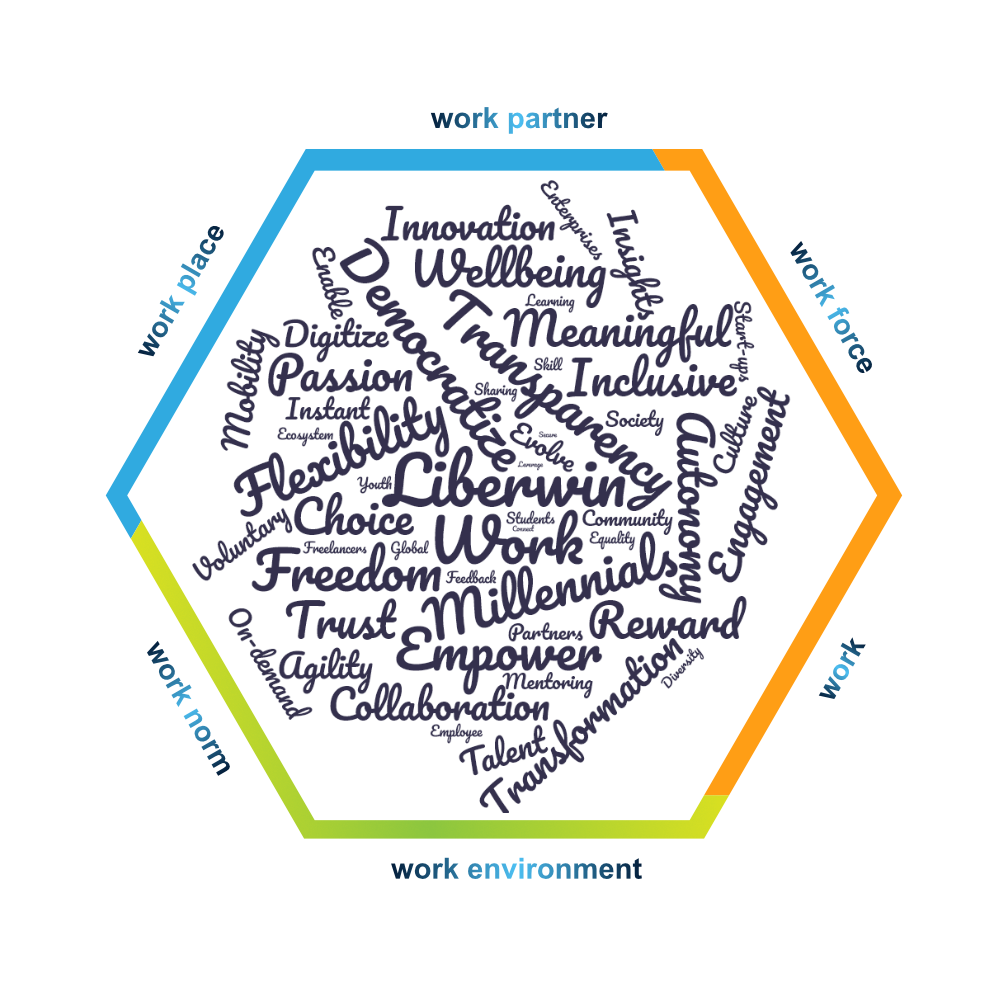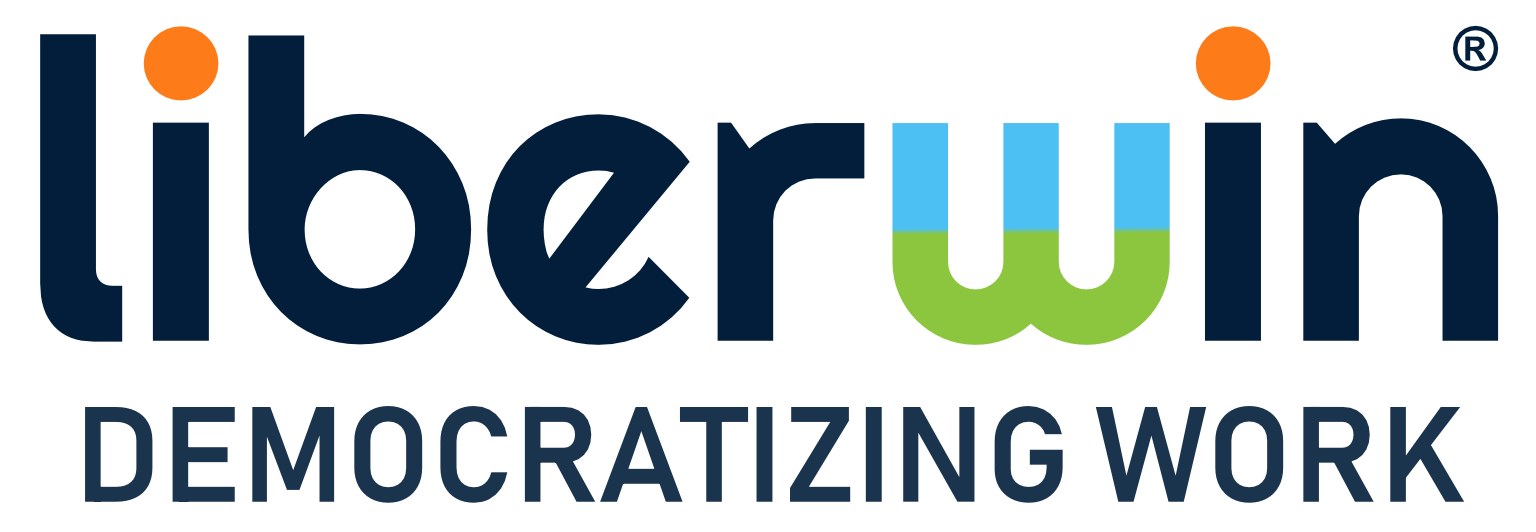Future of work is radically redefining how work, work-seekers, work-providers will co-exist while he workplace, work norms and work environment are undergoing disruptive change revolutionized by technology.
The 2030 agenda for Sustainable Development (17 Sustainable Development Goals) set by the United Nations General Assembly focuses upon several related elements like inclusive societies, life-long learning, gender equality, youth employment, decent work, innovation, sustainable cities, responsible consumption and production, etc. In a way, we see human-machine interface could play a pivotal role in how the future-of-work will evolve and impact humans, society and environment.

We believe “Democratization of Work” is the profound next step in bringing human energies together for the betterment of societies. Workforce need not be contained within corporate boundaries. Work need not be contained within the walls of the enterprises or governments. Work needs to be done by the people who are skilled to do it, irrespective of where they are or who they are. The world is moving towards a more inclusive, collaborative, transparent global environment which requires an empowered, participative workforce and flexible work environment.
With the advent of automation and AI, many traditional jobs are moving to machines, hence workforce are forced to realign their skills by life-long learning of new skills. Job cuts become regular exercise which take a toll on the workforce and their family’s well-being. By democratizing work, job losses will no more have an impact on workers as they have the world of opportunities available to continuously contribute and earn.
Work has evolved from hunting and gathering to agricultural lands to factories to corporate houses. Work, historically had to be performed in the workplace (lands or factories or offices), hence centralized in nature. Work existed where workplaces were, and work could only be performed at the workplaces. They were inseparable. Workplace brought all the stakeholders of the work under one roof. Work is done in a workplace under supervision by management as team-work, knowledge- transfer, conflict-resolution, working-rules and related worker-engagement heavily depended on physical proximity.
With the power of internet and communication technologies, information, entertainment, learning and communication are already democratized. With mobility solutions, location of workforce is becoming irrelevant, hence workplace and work are being separated. The rapid advancement of digital technologies (social, mobile, cloud, analytics, AI, etc.), availability of collaborative work spaces and wider use of hand-held smart devices present new opportunities for both enterprises and workers to break free from the constraints imposed by the traditional organizational models.
Millennials and gen-Z are making up the current and future of the Workforce. They are living in an era of smartphones, internet connectivity, having information at their fingertips, communicating with anyone from anywhere, accustomed to on-demand economy, fulfilling their needs with instantaneous access to products and services. They crave for work aligned with their passion and interests, work-life environment that is “flexible” which is not a typical 9-to-5 work day and wanting to live a meaningful life in their own terms (Be Your Own Boss – BYOB). Hence, the workforce is bidding adieu to the past paradigms of work arrangements (permanent, fixed-term, contractual, etc.) as per employment relationship, personal status (designation, benefits, tax, etc.) as per law and nature of work (job description, timings, locations, salary, career growth, retirement benefits, etc.). They are not worried about their identity and are often seen with deep digital connect, pursuing passion, seeking choices (in 1. type of work that leverages their skills 2. timing and location of work 3. fiscal and non-fiscal returns, 4. breaks and non-continuity in work, etc.) and building their own community (interest groups). Working with them now and in the future will require new ways of identifying, targeting, relating, engaging, leveraging and retaining them for work.
This is an interesting development for businesses (enterprises, SMBs, start-ups) to leverage and transform their businesses for the future. Enterprises and start-ups have a chance to transform their working model by matching their business aspirations with that of the millennial workforce. The workforce on the other hand can be presented with the freedom to choose their work, location and possibly the time. This will, in our opinion, go a long way in solving the big social and environmental problems such as traffic jams in cities, pollution, increasing stress induced health risks, deteriorating well-being of workers and so on.
The millennial workforce equipped with mobile, digital technologies and related knowledge is swarming the industries with new set of expectations from that of the previous generations. Enterprises now have an urgent need to re-look at their Work norms and talent management practices and adapt to this new workforce. The compensation structure, learning and development, career development, worker contracts, worker disciplinary rules built on long-term worker association model will have to change to accommodate the new environment of work that requires distributed or remote teams, leveraging gig-workers for on-demand work, more of short-term contracts or part-time working, paying right for the skills, getting the workers to continuously upgrade their skills to stay relevant and managing talent practices using an integrated digital talent platform.
Work partners are emerging to facilitate various areas (learning, career, rewards, payment, experience, etc.) of the newly emerging work ecosystem. “Learning partners” will provide ongoing support for people to constantly upgrade their skills. “Career partners” will provide insights to navigate the career path that people wish to pursue. “Rewards partners” will offer innovative and customized reward alternatives for people for their work. “Payment partners” will bring in convenience, choice and mode of payment solutions to people. “Experience partners” will offer a range of experience alternatives (travel, food, art, culture, entertainment, adventure, sports, social impact, environmental impact, etc.) to people to redeem the work credits / rewards that people accrue.
We welcome your thoughts about this article and your ideas on Future of Work. Please leave your comments below or write to [email protected]

Awesome post! Keep up the great work! 🙂
Great content! Super high-quality! Keep it up! 🙂
You’re a very practical website; couldn’t make it without ya!
Love the site– really individual pleasant and great deals to see!
I blog quite often and I seriously thank you for your content. The article has truly peaked my interest. I will bookmark your site and keep checking for new details about once a week. I opted in for your RSS feed as well.